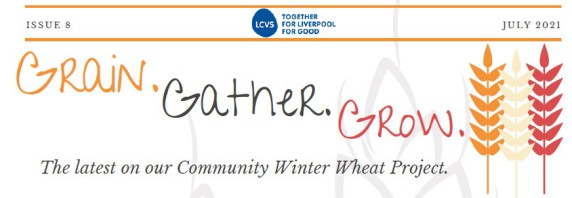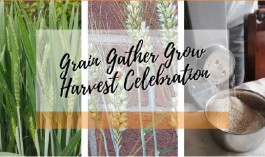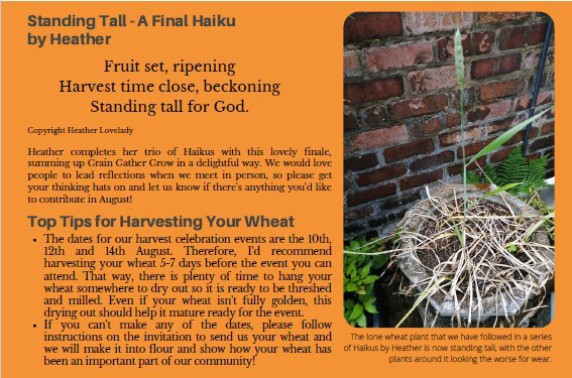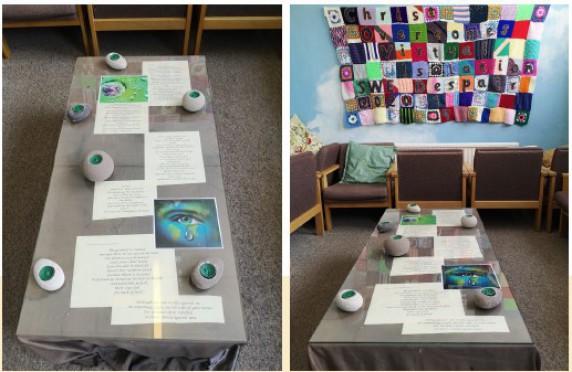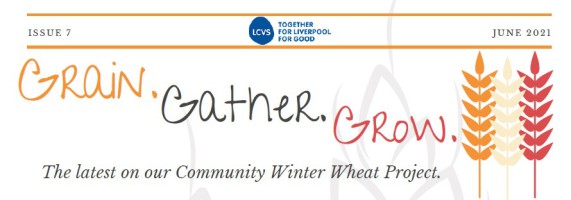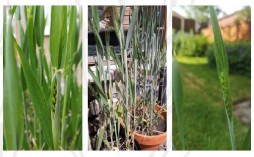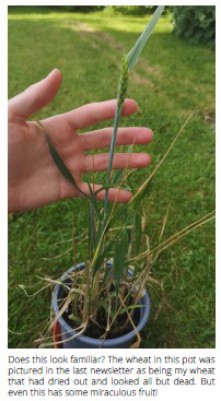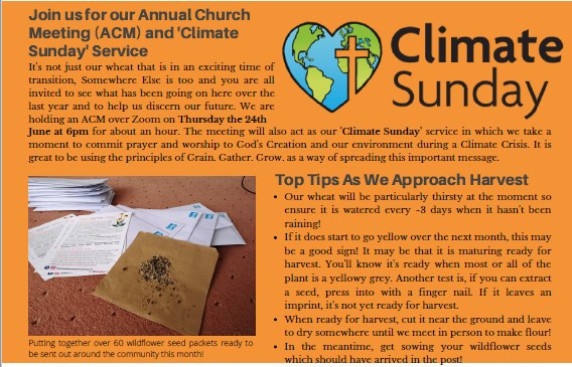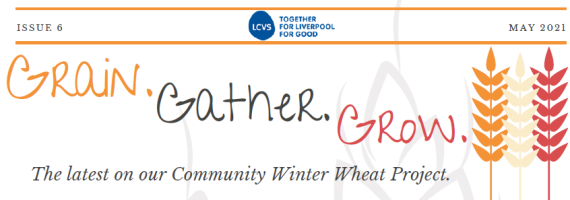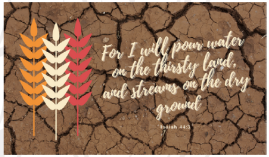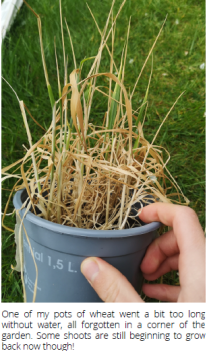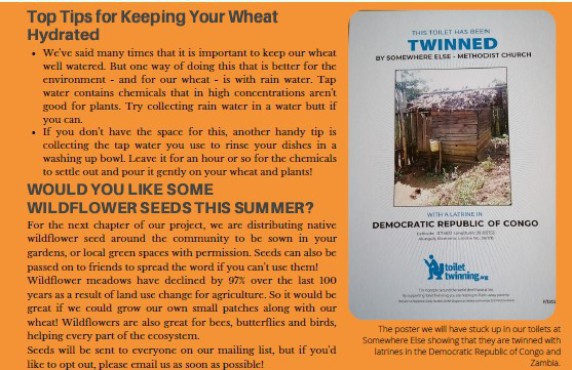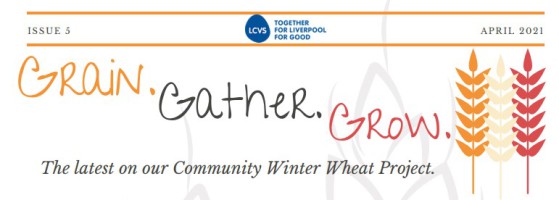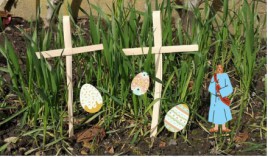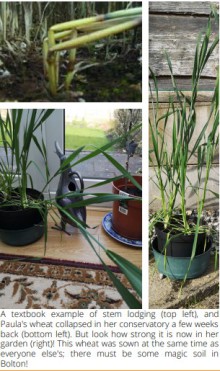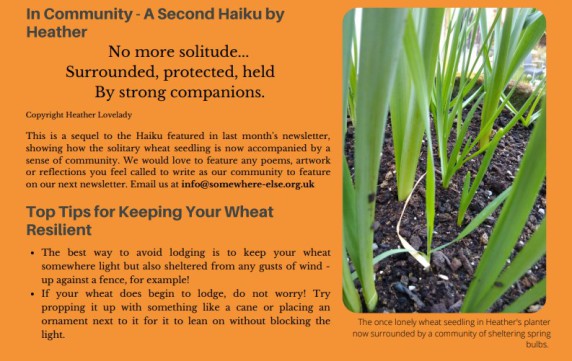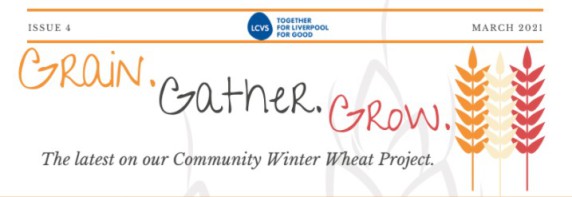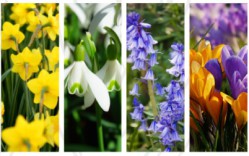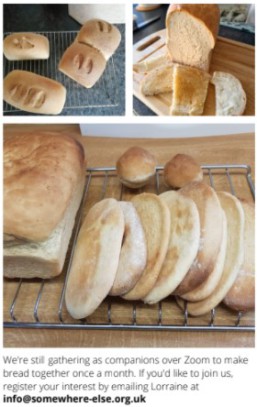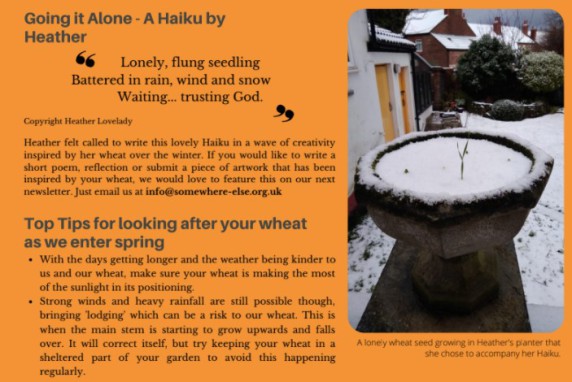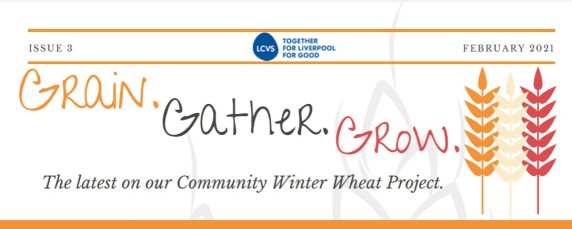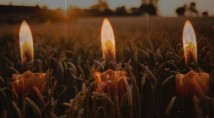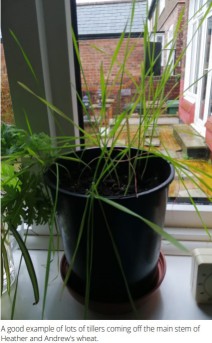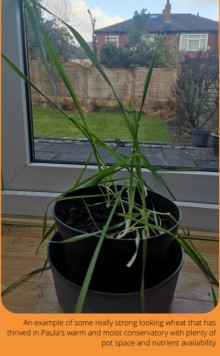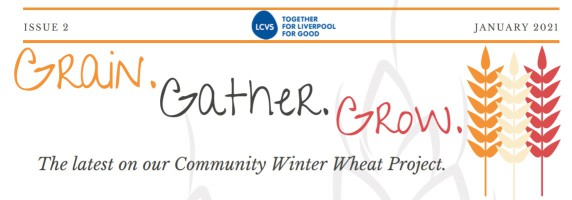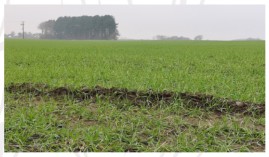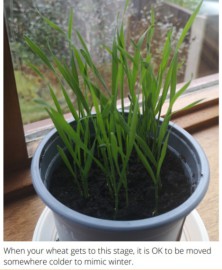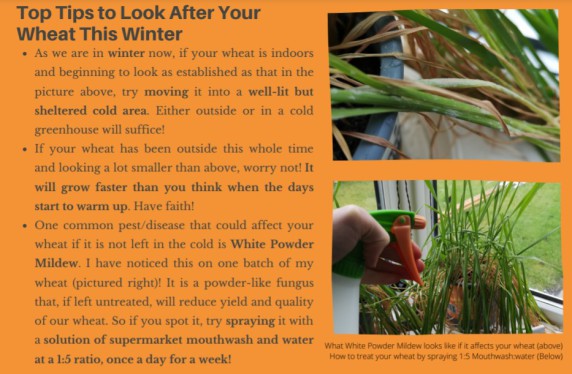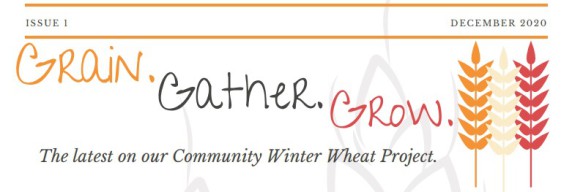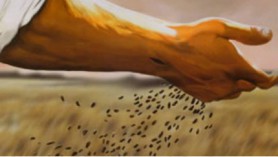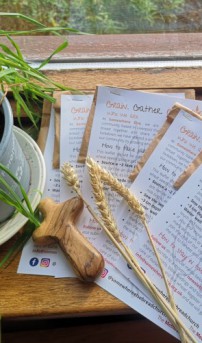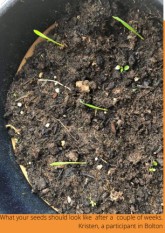Grain. Gather. Grow. - Winter Wheat Project
This project took place over year 2020-2021. People in our community still talk about it and some of us even grew wheat in 2022. Many thanks to Chris Williams for organising such an interesting project, especially as we were in lockdown for most of it.
Join Our Harvest Celebration!
This is now the penultimate newsletter for what has been such a fruitful project for our community over the last year. As our wheat is beginning to mature in preparation
for harvest, I was reminded this week of a photo I took exactly a year ago that inspired the start of Grain Gather Grow.
Whilst walking to my local corner shop a few days prior to my interview with SWE, I had my hood pulled up and my head down in the heavy rain when I noticed some wheat
growing out of a crack in the pavement. It must have got there from a birdfeeder over the wall, but it got me thinking how durable the crop must be if it could survive in such a small space in
suburban Liverpool. I pitched the idea that week of getting the Somewhere Else community to grow wheat from their own homes, keeping us connected while physically apart, but also connecting us with
the fundamental process of what it means to make bread.
From this small growth of wheat fighting for space in a man-made environment during one of the most scary and uncertain times of our generation, an immeasurable amount
of growth and development has occurred. It's not been easy. Some of our wheat has been consumed by birds and cats! Some has succumbed to drought orwind. Some has overcome all odds to grow
incrediblystrong!
What better way to celebrate this project than to come together next month and make loaves of bread from what we have grown as a community?
There are three dates in August. Booking for these events will be open on Eventbrite or via emailing us from Friday 16th July.
We look forward to meeting you,whether you have visited Somewhere Else before or not!
The Somewhere Else Reflection Table - Eco-themed
Those of you familiar with the buildingwhere the Somewhere Else communitymeets will recognise the reflection tablethat Robert updates regularly and hascontinued to do so admirably overlockdown for us
to see on social media.
'The ground is cracked because there is no rain in the land; the farmers are dismayed and cover their heads. Even the doe in the field deserts her new born fawn because there is no grass. Wild donkeys stand on the barren heights and pant like jackals; their eyes fail for lack of food.'
Jeremiah 14:4-7 NIV
This month's theme seemed fitting, based on the environment and is accompaniedby the following prayer from the Methodist Prayer
Handbook.
Dear Lord,
Earth is a world of water,
Earth is a special place,
Earth is a mind-blowing miracle,
Earth is truly ace.
Forgive us for our sins
And let us rise, not fall.
Let us stand together and change
for the good of all.
Please let us save this beauty,
for there is only one.
Please help us save this planet,
Lord, help us change this wrong.
Amen
Jimmy, a pupil from Croston Methodist C of E Primary School.
Pictures from around the Community
Our Community Bears Great Fruit!
The last few weeks have seen an incredible transition in our wheat across the community! Within the space of just one week, I was delighted to be getting bombarded with
excited messages as people shared pictures of fruit
emerging from the stems of their wheat.
Wheat that had previously looked like it was clinging on for life (including my own!) is now bearing miraculous fruits that will soon become the grain that we
will
harvest to turn into flour.
Some have just one or two small ears appearing on their crop, some would make most farmers jealous, and others have none just yet. But all will be welcome to join us in
a few weeks' time to bring our harvest together.
Keep an eye out for an invitation to the event as we finalise plans for the week of August 9th over the next couple of weeks!
In the meantime, lots of work has been going on behind the scenes to run refresher training for our Facilitators to ensure that we are in as safe a position as possible to reopen to the public and make bread together once again!
It is this hard work that we have put into supporting one another and growing our wheat, and our trust in the Lord that He will provide, that has led to the abundant
fruitsthat we have enjoyed and will enjoy as a community.
We are excited to see how we can use the fruits we have been blessed with to bless others. Whether that be literally feeding those in need with the bread we make, or
being more metaphorical by using the things we have learnt inthis process to teach others about growing, looking after our wellbeing and caring for our planet.
This last is one thing we hope to do later this month in reflecting on God's Creation in a Climate Sunday service.
The Miraculous Fruits of the Spirit
'But the fruit of the Spirit is love,joy, peace, forbearance, kindness, goodness, faithfulness, gentleness and self-control. Against such things there is no law. Those who belong to Chrsit Jesus have crucified the flesh with its desires. Since we live by the Spirit, let us keep in step with the spirit. Let us not become conceited, provoking and envying each other.' Galatians 5:22-26 NIV
As soon as I saw the fruit appearing on my wheat, I thought of this passage about the fruits of the Spirit and how our project could be a manifestation of them.
Then I was struck by the contrast between what are all lovely words in the first two verses "love, joy, peace, etc." and the brutality of
the words "crucified the flesh".This was not how I had remembered this bible passage to be!
However, it shows the importance of the suffering that Jesus endured for us and our sins so that we could bear his nourishing and life-giving fruit. To give us hope of ridding the world of
sin.
And I see similarities in our wheat. It could be easy for us to look at our wheat and go,"Oh aren't those fruits lovely!" without
acknowledging what it has had to endure to get here. It has been resilient through an exceptionally cold and harsh winter, a biblically wet January and February, followed by an extremely dry April
and another wet May!
Out of this resilience comes the fruit of the Spirit that God has blessed us with through our doubts and anxieties. May we continue to see
God's fruits in our lives and remember to thank Him for them so that we can be blessed and bless others with them.
This is a poem by Laura Crean that I found, inspired by the Fruits of the Spirit
I am learning every day
to live in love
to do and pray.
I am seeing more and more
that God is knocking
on my door.
And in my daily walk I see
that Jesus' light
reflects in me.
But I must DO and I must BE
what I in others wish to see.
So love and you will then be loved,
be joyful in your journey.
Let peace reside within your heart
then why would you need an army?
Have patience, do not stress or rush,
be calm and take your time.
Be kind and show you have respect,
do good - say no to crime.
Be faithful in your daily life
and gentleness will follow.
Lastly show some self-control,
in your impulses do not wallow.
If you bare all of these good fruits,
your life will be so rich.
You will find that you are greatly blessed,
for all this is my wish.
Pictures from around the Community
Dry Conditions Test Our
Wheat and Our World
Last month was one of the driest and frostiest Aprils on record, with less than 20% of the average amount of rainfall for the month. This has led to the ground being
very dry in places, with reports of early wildfires occurring in parts of the UK. Freakishly cold spells have
also led to challenges for farmers sowing their summer crops. The challenges have also been shown in our much smaller scale project!
Some of you may be anxious that your wheat has dried out, or struggled in the morning frosts. But do not worry! I spent the last lockdown away from home in Bolton, leaving a batch of my wheat to the care of my family here in Merseyside. You can turn to the next page to see how that went... Our project was never going to be perfect, but we can be sure that there will be enough wheat around the community to make a bountiful harvest come the summer!
Our Quest for Eco Church Status
As part of the Grain Gather Grow project, Somewhere Else has been working as a community to boost its stewardship of God's Earth and achieve the A Rocha UK Eco Church award. We applied for Bronze last month, a mark of the already strong Environmental Awareness and Social Justice ethos of our church. One big part of this has been gettingthe toilets we use at Somewhere Else 'Twinned' with toilets in Africa, sponsoring their construction. We chose to specifically sponsor toilets in the Democratic Republic of Congo due to nationals from there being loved members ofour amazing community. As we consider this topic ofdrought and water insecurity, it is important for us to acknowledge the daily struggles of people around the world for simple necessities like water. We are called to underpin our action with prayer for environmental justice, but there are other things we can do to be more aware of our water use...
Jesus Gives us the Water of Life!
'Jesus answered, "Everyone who drinks this water willbe thirsty again, but whoever drinks water I give them
will never thirst. Indeed, the water I give them will become in them a spring of water welling up to eternal life."'
John 4:13-14 NIV
This passage from the Gospel of John invites us to explore the concept of the"water of life". This is not the water in the well that Jesus refers to first. No matter how much we drink of that water,
we will once again be thirsty. No more efficient way of extracting this water from the deep well will quench our thirst. Equally, no earthly things will satisfy our longing for God. We seek these
kinds of 'water' because we are trying to quench our spiritual thirst.
Instead, the water that Jesus offers us hereis that of the Holy Spirit - a healed relationship with God, through salvation in Christ. We often know the ways in which we
can quench this thirst: through prayer,worship, relationship and being loving to one another.
All these things deepen our roots and make us more receptive to Jesus' water of life. They also make us more resilient in times of apparent drought, to have trust and
faith in the water of life.
For me, this links with the parable of the sower we looked at in our first newsletter. The seed that fell on shallow earth germinated and grew in great enthusiasm. But
when a drought came, its roots weren't sufficient and it withered and died. This reminds me of the pot of wheat I showed you above, but is also a reminder that all we
need to sustain us is to seek Jesus' water of life.
The following prayer is from Barbara Glasson's 'Reflections on the Water' (KevinMayhew Ltd). It was written as a prayer to say before we sleep; for our glass of water
beside our beds:
Thank you God,
for the rain that has filled the reservoir,
for the pipe leading under the street
to my house,
the stopcocks under the sink,
for the steel cold tap,
for this clear glass
and clean water.
Forgive me for taking it for granted,
as I stretch out my hand in the night todrink it
may I reach out my hand in the day
to those for whom clean water
is not within reach.
Amen
Copyright 2020 Barbara Glasson
Pictures from around the Community
He Is Risen Indeed, Hallelujah!
Over the last month, we have journeyed through Lent together as a community, culminating in a celebration of the the death and resurrection of Jesus. This is a very important and hope-giving time of the religious calendar, reminding us all that our sins are forgiven and drawing us closer to God and to one another.
For the Somewhere Else community, this saw us finishing our Lent reflection series with a very successful Challah breadmaking session on 27th March followed by a week of Baking Through Holy Week (see our website and social media for more details).
Some of our wheat, however, is and will be portraying the Easter story in a much more physical representation through a very common process called Lodging...
What is Lodging? And How Does it Relate to Jesus?
Lodging is where a crop of wheat falls over due to pressure from wind, rain or animal disturbance. This diminishes the wheat's ability to grow, reducing yield, as well as increasing the cost to farmers by having to spend longer drying the wheat out. Up to 20% of UK winter wheat can lodge in bad winters!
However, all hope is not lost when lodging occurs. As we have seen many times already on our journey, winter wheat is a very resilient crop. Paula's wheat has lodged several times in her conservatory in Bolton after being knocked down as her plants are watered and rearranged. But, each time it has bounced back and is now the tallest wheat I know of throughout the whole project at over 2 foot tall!
Like Jesus, our wheat endures a lot of pressure from its surroundings. But this does not stop it coming back stronger than before to complete what it came to do and bear incredible fruit.
The Importance of Diversity for our Wheat and our Community
'Then the eleven disciples went to Galilee, to the mountain where Jesus had told them to go. When they saw him, they worshiped him; but some doubted. Then Jesus came to them and said, “All authority in heaven and on earth has been given to me. Therefore go and make disciples of all nations, baptizing them in the name of the Father and of the Son and of the Holy Spirit, and teaching them to obey everything I have commanded you. And surely I am with you always, to the very end of the age.”' Matthew 28:16-20 NIV
These last few verses of Matthew's gospel are known as 'The Great Commission' as Jesus - who has just risen from the dead a few verses before - gathers his followers to give them authority to go and baptise all the nations.
A prominent note in this passage for me, is the simple phrase "but some doubted". This is a common theme throughout the Gospels, of people choosing to discredit, to persecute, or simply to doubt Jesus and his work.
Despite all this, Jesus continued to preach to, bless and serve others. Even when his persecution led to his capture and death, still he rose to conquer sin. Yet still people doubt!
We all doubt things in our lives, especially our own ability, and even that God can get us out of whatever mess we find ourselves in.
But as we doubt, still He rises! Even when we don't feel it or see it, He is working. Despite all the persecution aimed at Jesus, still He rises! Similarly, even when our wheat is 'lodged' and battered by harsh weather, still it rises!
Jesus has given us authority in Matthew 28 to go out into this world as he did - being a disciple to others, teaching them the good news that he has risen, and we must battle our doubts.
Let us pray:
Father God, we are sorry for the ways that we doubt ourselves,
the ways in which we fail to put our trust in you,
and the ways we cause others around us to doubt themselves.
May we turn to you in all situations.
Jesus, we thank you for the authority
you gave us as your followers in Matthew 28.
May we honour the trust you have given us
by using it to proclaim your word.
Lord Jesus, we praise your name that you
rose above all sin and human imperfection
to conquer death and give us life.
May we always acknowledge the sacrifice
you have made for us.
Merciful Father, we ask that you give us
the courage to rise and stand up against
persecution, prejudice and injustice.
May we rise in resilience like our wheat
no matter what comes our way.
Amen.
Pictures from around our Community
Our Wheat is Making Us 'Companions'!
We have been blessed with some beautiful weather
recently (or at least as I write this...) as we welcome in
spring and all the hope, light and new life that comes
along with it. This hope is added to when we hear the
news of a 'road map' out of lockdown by the summer.
If all goes to plan, we are praying and planning to come together in person with our harvested wheat for a day or two of threshing, milling and breadmaking.
As we come together, we will be able to catch up with or meet one another, sharing stories and experiences as many grains of wheat coming together in one loaf - or
companions.
The Origin of the Word 'Companion'!
To be a companion means simply to be 'one who accompanies or associates with another'. But this derives from the Latin phrase 'Companis': Com-(together with), Panis (bread). 'Together with bread'. This then developed in Old French to 'Compaignon':'One who breaks bread with another' which is wherewe get our English word of 'Companion' from.
How lovely is that? When we come together to
conclude this wheat project, we will be sharing in each other's company - making one body of bread, becoming that one body of bread, then breaking and sharing that one body of bread with one another
and with the community around us.
The simple wheat we have put the effort in to
nurture and grow through such hard times will
hopefully represent such a powerful message for ourcommunity. How else can we be companions?
The Importance of Diversity for our Wheat and our Community
'Now if the foot should say, "Because I am not a hand, I do not belong to the body," it would not for that reason stop being part of the body. And if the ear should say, "Because I am not an eye, I do not belong to the body," it would not for that reason stop being
part of the body. If the whole body were an eye, where would the sense of hearing be? If the whole body were an ear, where would the
sense of smell be? But in fact God has placed the parts in the body, every one of them, just as he wanted them to be. If they were
all one part, where would the body be? As it is, there are many parts, but one body.'
1 Corinthians 12:15-20
This reading highlights a seemingly obvious point of how each part of our bodies perform different functions and are important in their own unique ways. This has implications, however, on how we should see each other as members of one body, of one kingdom: God's kingdom.
We have just come out of a month of commemorating LGBTQ+ History, where
diversity has been celebrated across the world. During this time, we celebrate the lives, stories and contributions of those who have historically been - and in many places still are - seen as alien
to the body of society.
Diversity is also very important for the history of our wheat! Wheat is one of the
most diverse species on the planet, with over 25,000 varieties and more DNA per
genome than we have as humans! It's this diversity that has made it so successful;
there is a variation best suited for each characteristic: tolerance of heat and water,
resistance to pests, starch content, stem length, and more! All of these variations
have been brought together and used in the winter bread wheat we use today to
make such a strong crop.
Similarly, all our diversity and strengths as individuals come together to form one body as God's church.
Let us pray:
Heavenly Father, we thank you for the
unique and beautiful identities you have
given us all.
And that, though we have our different
strengths and weaknesses, we are united
in you and your love.
Loving Father, we come in your name to
celebrate the diversity of our community,
country and world.
That when we come together as one body,
we are filled with your Spirit.
Merciful God, we lift to you those who
feel ostracised and excluded by their
family and community.
May they be continually reminded that
Jesus loves the lost and will leave the 99
for them.
Holy Spirit, give us the strength and
courage to reach out and stand up for the
excluded, as Jesus did.
Amen.
Pictures from around our Community
How We Can Be Optimistic Like Our Wheat At the beginning of this month, we - the Somewhere Else community - got together on Zoom for a service to celebrate Candlemas. This was a lovely intimate time together, reflecting over a Holy Day that is seen by some as the end of the Christmas period. Maybe, for us as a community of winter wheat growers, this time can seem to be the beginning of the end of winter - a seemingly long winter. And at the end of this winter, Candlemas reveals the inextinguishable flame of optimism that God promises us all. This light illuminates the darkest of skies and brings with it the source of new growth. At the same time as this, our wheat has entered a new stage of growth called the tillering phase which allows it to make the most of this light of hope...
What is Tillering?
Many of you may have noticed that your wheat has a few grass-like strands coming off it that look limp and struggling to be held up. Worry not, these are called tillers and are essential to winter wheat. They're all about spreading the otherwise narrow plant out, orientating it to the light. Come the end of winter, when the days are warm enough, these tillers will die and the wheat will shoot upwards and begin to flower.
So by undergoing this tillering process, the wheat makes the most of the light, making it somewhat of an optimist in the darkness of winter. In what ways are we feeling God's light of hope at the moment, and what can we be doing to make the most of it in our lives?
Top Tips to Help Your Wheat
Make the Most of the Light
- Although our wheat doesn't need as much water in the winter, it is still essential in the tillering phase that it has enough water. So make sure your soil is still always kept moist to the touch - watering it lightly once a week/fortnight.
- Help your tillers make the most of the light in your room/garden. Try rotating your pot of wheat periodically if it is on a window sill, or untangling the tillers so they are facing the light. Every little helps!
- Another thing which can help our wheat in this phase (but isn't essential) is more nutrients. A simple way of doing this without using chemicals is using used tea leaves from tea bags, ground egg shells and banana skins. Blend it all up and add a few tea spoons to the top of your soil. This will be great food for your wheat and reduces food waste!
A Reflection on a Poem: A Flame That Cannot Be Put Out
In the dark days:
under rain-heavy clouds,
among broken branches,
on sodden earth,
the snowdrops light their candles.
A flame that cannot be put out
by darkness or gales or doubt.
In the salt wind,
rooks buckle like broken umbrellas;
as the bare trees
heave a great sigh,
the snowdrops tremble.
But their flame cannot be put out
by darkness or gales or doubt.
Perfect, as though carved
in green-veined marble,
life pulsing through tissue
delicate as the eyelids
of a sleeping child,
curved like small fingers,
holding on.
Their flame is steadfast:
it is full of hope and new beginnings.
Darkness of gales or doubt cannot put it out.
Copyright Jan Sutch Pickard from Sing but Keep on walking
Wildgoose publications ISBN 9781849526968
This beautiful poem came from Jan Sutch Pickard, a poet and storyteller from the Isle of Mull, and member of the Iona Community.
The link between the hope and light of Candlemas, and the strength and resilience of God's creation is highlighted eloquently.
Like the steadfast snowdrops brightening up the dark days of winter, our wheat also defeats the battering chill of the season. That is not to mean that it is easy! God gives us strength through hardship, shines our light through darkness; He doesn't promise an easy road. As Pickard writes, the bare trees 'heave a great sigh' and the 'snowdrops tremble', but neither darkness, gales or doubt can put out the flame that God has put in them.
Likewise, we can take hope and optimism from this, the promise that God gives us growth, light and new creation through hardship. Our roots strengthen in the wind and frost, and we come out of the winter with a burning flame that cannot be extinguished and is ready to share its warmth and light for the growth of others around us.
Let us pray: Father God, we thank you for the strength that you promise through your inextinguishable flame that provides us with hope, light and courage in the depths of winter. Lord God, we repent of the ways in which we have failed to steward your Earth. May we learn to take care of the biodiversity and environment we are blessed with.
Gracious God, we lift up to you those for whom the winter has felt too much. The homeless, the anxious, the survivors, let them feel in their hearts your grace and your promise of renewed hope.
Merciful Father, we pray that the growth that comes with the change of season is towards you and in your way, so that we can continue to live for you. Amen.
Pictures from around the Community
Our Wheat Thrives through Challenging Winter
It's a new year which has brought with it a new lockdown alongside some very cold weather and dark nights. More challenges come with this for physical and mental health as we wait for a vaccine in a time that can feel somewhat frustrating but also hopeful. For the 100 or so of us in this community growing wheat together, many similarities can be drawn between this feeling and our experience in watching our collective crop grow. Hope, however, can be drawn from what we can learn about the importance of a cold and dark winter in the process of growth...
The Importance of Winter for our Wheat Our wheat is a winter bread variety, which is sown usually in autumn and harvested in late spring, unlike the more common spring wheat sown in spring. This means it takes longer to grow as it has to 'over-winter' during which it holds tight and waits until the days get warmer and brighter. This has its benefits, and the harder the winter frost, the better chance the wheat in farmers' fields has of producing a greater yield. This is because the wheat establishes itself in the lead up to winter building resistance to the frost that comes and kills off diseases, pests and weeds that would otherwise outcompete it. Although it may seem brutal, patience and trust through this winter is essential for our wheat (and ourselves!). The harder the frost - the more the wheat stands strong through it - the more it resists and becomes stronger against pests and diseases. Sounds almost biblical, doesn't it?!
The Spiritual Importance of Waiting for Growth
"Do you not know? Have you not heard? The Lord is the everlasting God, the Creator of the ends of the earth. He will not grow tired or weary, and his understanding no one can fathom. He gives strength to the weary and increases the power of the weak. Even youths grow tired and weary, and young men stumble and fall; but those who hope in the Lord will renew their strength. They will soar on wings like eagles; they will run and not grow weary, they will walk and not be faint" Matthew 13:3-9 NIV
This is a profound message in Isaiah, a promise to those who feel tired, weak, weary: if you wait on and hope in the Lord, He will renew your strength. As we have said, this is true for our wheat. What may seem like a bad time to grow such a delicate, grass-looking plant, 'waiting' through winter actually provides it with more strength and resilience for its quick growth-spurt to come in the spring, protecting it from pests and diseases that would otherwise have reduced its fruitfulness if it had not 'waited'.
As this passage from Isaiah proves, the same can be said for us in this particularly harsh winter. Us waiting and being faithful in the Lord in this anxious time of lockdown will lead to a renewing of our strength. Not just in protecting the NHS and improving the effectiveness of the vaccine roll-out; but this can be an opportunity for us to all to slow down and spend time in prayer with God, allowing him to build our strength in adversity so we can come back stronger and bear more of his fruit when things eventually get back to normal.
Let us pray:
Father God, we come before you
in this time of uncertainty,
when it seems like there is little room for growth and flourishing.
Grant us your patience
to wait through this period
for the strength and glory you promise us.
Loving God, we thank you
for your everlasting presence,
your light in the darkness
that guides and sustains us through these times.
May this line continue to shine on
ourselves and those around us.
Gracious God, as we wait on your Holy Spirit,
we ask that it protects us from the pests
and diseases of the enemy.
May you break the chains of illness,
anxiety and sin
So we may emerge in the spring with new
life and growth in Jesus name.
Amen
Pictures from around the Community
Welcome to Grain Gather Grow! It's not too late to order seeds by emailing us...! If you are receiving this newsletter, you are one of the ~80 (and counting!) people and organisations currently taking part in our new project in which we aim to grow wheat together as a community as we - quite literally - share in one body of bread, following the process from grain to loaf.
At the time of writing, 75 seed packets have been sent out by post. They have reached way beyond the boundaries of our church Circuit to every corner of the Liverpool City Region, Lancashire, Greater Manchester, the Midlands and even Belgium!
Two thirds of you have not attended Somewhere Else before, and we are delighted to have you on board. We hope you enjoy being a part of our community as we come together virtually during these difficult times of social distancing. Fellowship is an important aspect of Christian faith and we hope to embody that in this ecumenical project!
The Story of our Wheat
Our wheat was sourced very randomly back in September from a local farm owned by a friend of a friend in Ince Blundell that had just happened to sow 300 hectares of the seed a week before. The farmer very generously donated half a potato sack of the grain from his silo for us to sow, and was compensated with a loaf of our very own bread baked at our first virtual breadmaking session. Thus beginning the cycle we wish to complete in making our own locally sourced bread next summer!
Top Tips to Look After Your Wheat Early On
- Do not worry if your wheat hasn't started to sprout above the surface yet. Depending on temperature and water and nutrient availability, this can take anywhere between 5 and 20 days.
- The best spacing between seeds in your pot is around 2cm. Don't worry if you think you have put too many seeds in your pot, they can always be removed later if it looks too dense.
- Avoid over-watering your seeds. A good soaking twice a week should be sufficient.
The Parable of the Sower and our Community
"A farmer went out to sow his seed. As he was scattering the seed, some fell along the path, and the birds came and ate it up. Some fell on rocky places, where it did not have much soil. It sprang up quickly, because the soil was shallow. But when the sun came up,the plants were scorched, and they withered because they had no root. Other seed fell among the thorns, which grew up and choked the plant. Still other seed fell on good soil, where it produced a crop - a hundred, sixty or thirty times what was sown." Matthew 13:3-9 NIV
The Parable of the Sower is a well-used parable in sermons. The soil is intended to be a metaphor for our hearts as humans and followers of Christ. If our hearts are 'good soil', then we will receive the word from Christ, sending down strong roots into our hearts and spirits, feeling the full effect of its nourishment to produce magnificent fruits.
We have an opportunity now, as a community, to live out this metaphor. By nurturing our soil (quite literally) to grow wheat, spending time reaching out to our communities, being mindful of our environment, and 'praying by doing', we are opening our hearts to His love in our lives and in our community.
Throughout this project, we hope to remove from our soil the rocks of anxiety and stress we are collectively experiencing in life at the moment. We will uproot any thorns or weeds that might threaten to out-compete the growth of the fruits God has given us. We will place our seed where it will receive the most of the available light. We will share the fruits we are blessed with, with one another in bread when we can finally meet again.
Let us pray:
Father God, we thank you
for the seeds you sow in our lives,
day after day, seen and unseen.
We pray that each will land on good soil.
Merciful God, we invite you in
to till our soil,
so that it is strong to deal with
every change of season,
always supporting new growth.
Gracious God, we ask for forgiveness
for the times that we have allowed our soil
to grow hard to the seeds,
and given too much room for the birds
to take them away.
May we know that we can always turn to you.
Lord, we pray for those in need,
whose rocks in their soil appear too much
of a burden to lift.
May they be comforted in knowing that
you will do all the heavy lifting.
Amen.
Pictures from around the Community

